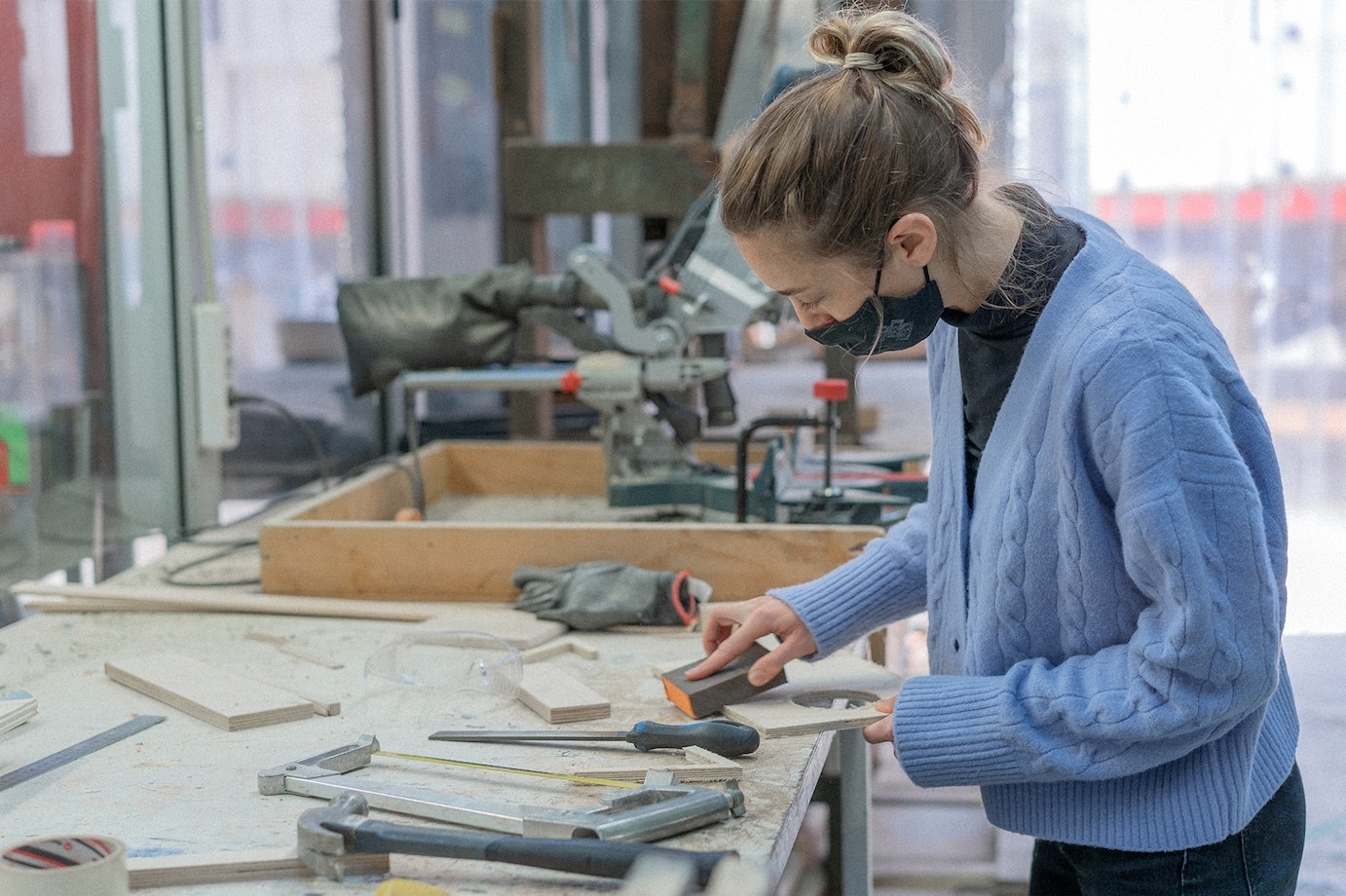Catalonia (Barcelona)
The Fabricademy program is training a global community of transdisciplinary designers to propose new ways of making, designing, wiring and even growing materials. They’re at the cutting edge of the sustainable future of textiles.
We’ve become used to buying, consuming and disposing of products without any concept of the environmental or social impact. This is certainly true in the world of fashion and textiles, where ‘Fast Fashion’ has quickly become synonymous with the industrial ‘make, take, waste’ approach to consumer goods. There is a lack of transparency and open knowledge about materials and production systems – from the energy consumed in production, the impact of labour practices or the waste produced at the end of the cycle.
Fabricademy wants to change this by focusing on how the next-generation of designers are educated. It trains students to develop new technologies which can be applied in the textile industry in a broad range of applications, from fashion to the upcoming wearable market.
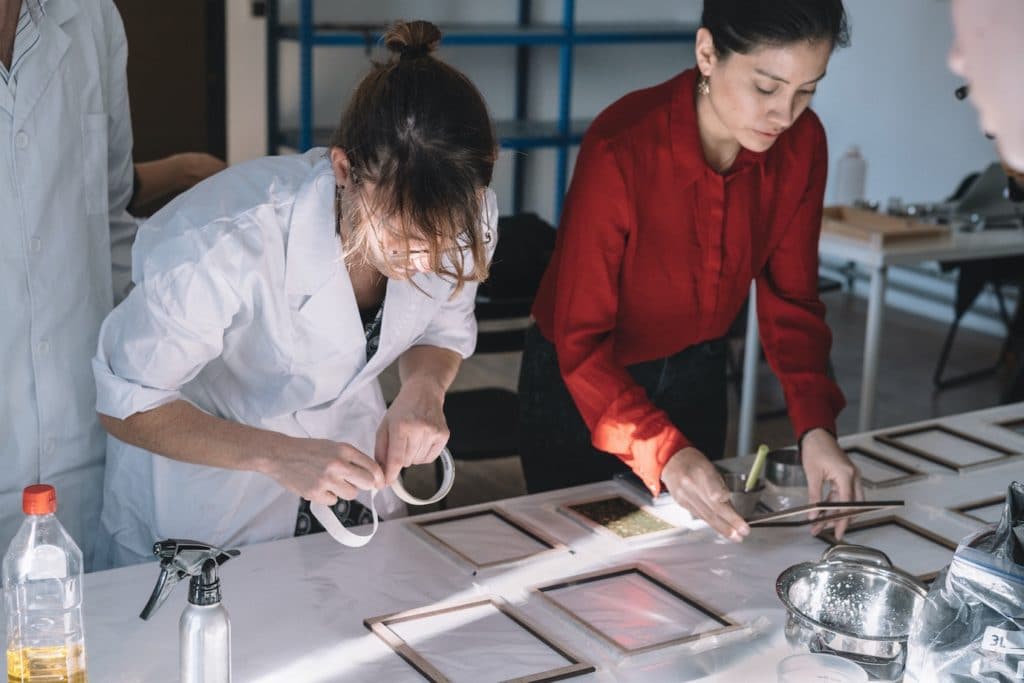
Fabricademy students explore how to make their own materials. Fab Lab Barcelona 2021
What makes the program avant-garde? Fabricademy is a ‘distributed learning program.’ Based on the Fab Academy model, developed at MIT, the yearly student cohort is distributed across the world in a giant global classroom. Students join common lectures online, while practicing hands-on inside Fab Labs, ‘local fabrication laboratories which aim to democratise access to personal and collaborative invention using digital technologies.’
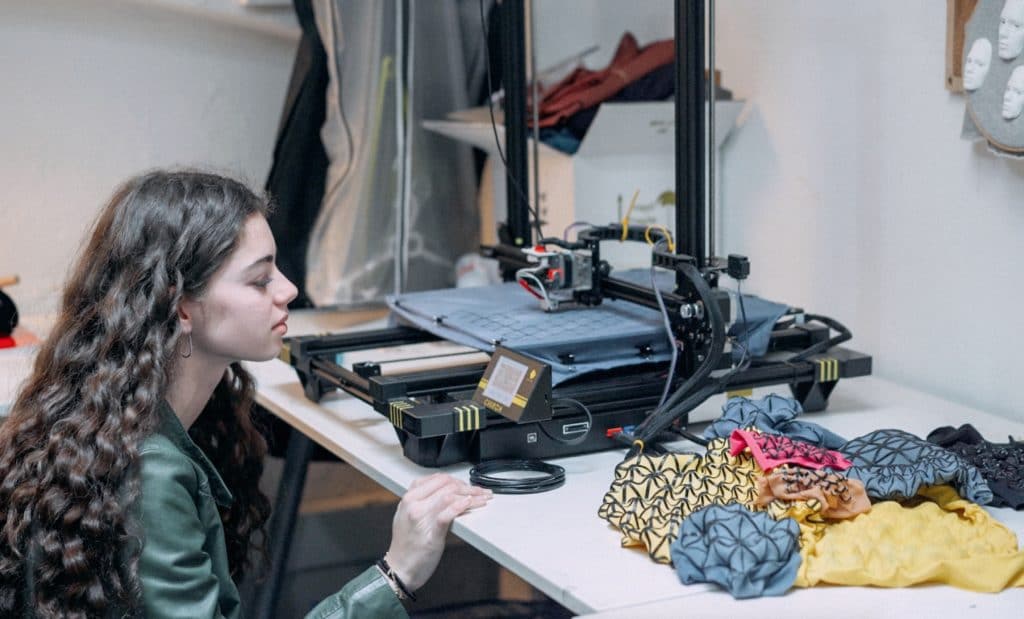
Fabricademy Barcelona Student, Amaya De Yavorski 3D printing on fabrics for her final collection, 2019
There are over 1850 Fab Labs worldwide, which provide a giant campus for practitioners to use domestic-scale tools such as 3D printers or laser cutters to design and fabricate almost anything. In Fabricademy, these machines are put to the test alongside traditional processes to develop innovative products at the intersection of textiles, digital fabrication and biology. From working with textile electronics to cooking bioplastics, students develop a fabrication arsenal that can be applied to a final project. Weekly masterclasses with industry experts also cover practical skills such as project management and business acumen. The quality of projects that graduate the Fabricademy course not only reflects the skills and knowledge of the students, but also their own interests, passions and cultures.
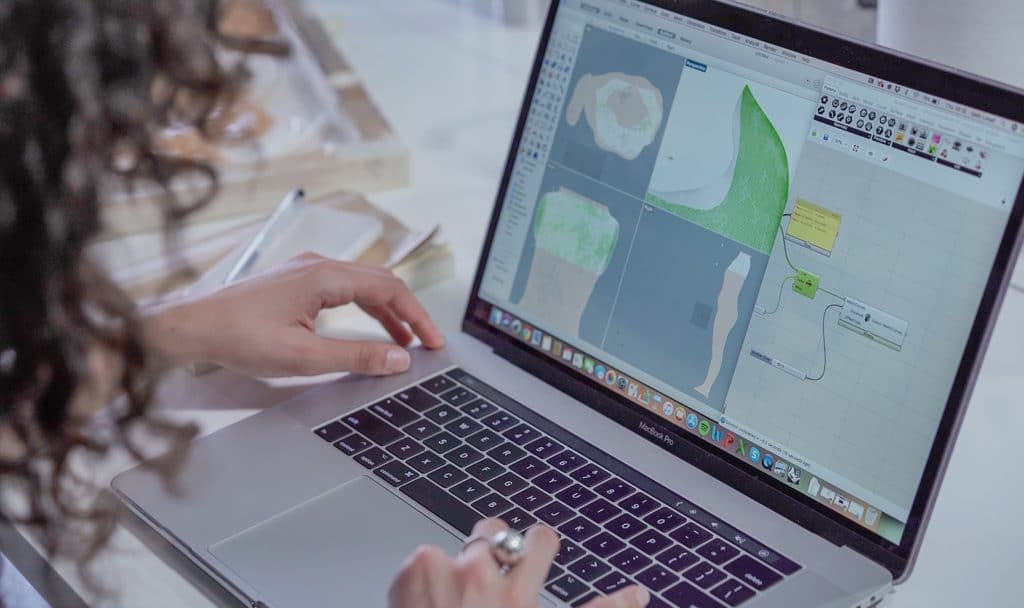
Getting crafty with digital tools as part of the Fabricademy course. Fab Lab Barcelona 2021
Anastasia Pistofidou is the course co-founder and lead of Materials and Textiles at Fab Lab Barcelona located in the Institute for Advanced Architecture of Catalonia, where Fabricademy is delivered locally with post-graduate certification by the Polytechnic University of Catalonia (UPC). She has seen many various projects graduate from the program.
“The projects that come out of Fabricademy are very diverse, corresponding to the complexity of the textile industry. They demonstrate both the empowerment and skills that the program provides to the participants and the necessity to reinvent our way of living, consuming and producing by bridging the gap between academia and industry.”
Anastasia co-founded the program to focus on finding local, distributed solutions to rethink industrial processes used in textile production and design. Through her own materials research practice FabTextiles, she has been developing her own innovative materials and processes such as bioleathers made from coffee grounds , color changing thermochromic garments; 3D printed fashion; open publications for making bioplastic recipes, and natural dyes including vibrant purples achieved with bacteria. She uses her personal experience and endless curiosity to mentor participants about the need to design circular design processes, from the materials, to the tools and the complete reinvention of production methods, in order to implement more sustainable, innovative and socially just solutions.
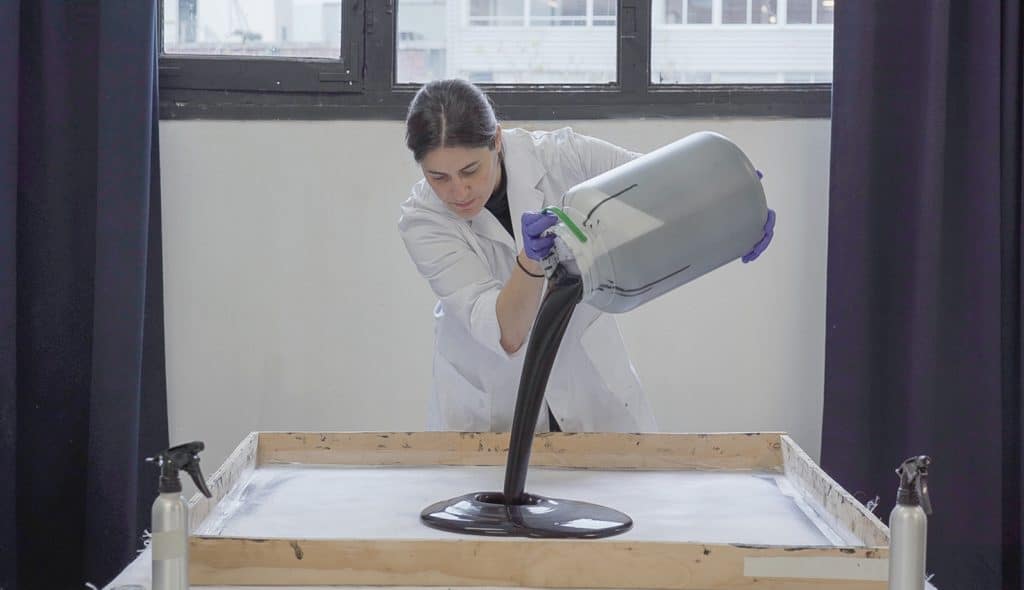
Fabricademy co-founder Anastasia Pistofidou practices under ‘Fabtextiles’ and is committed to innovating the textile industry.
The program is all about real-world impact. Participants often come from, and return to industry after graduation, taking new ways of working with them. Others use the opportunity to ideate and create new business models that can help them to establish their own practice as textile entrepreneurs. Learning is supported by industry experts who help students to position their ideas and investigate how the textile and fashion industries can benefit from new technologies, processes and business models.
Betiana Pavón graduated from Fabricademy Barcelona in 2019. Betiana joined the course as Creative Director of the “Alaska Accessories” brand, which focuses on revaluing and adapting the traditional millinery to a contemporary environment and wearers. During the course she developed her digital fabrication skills-set and has since been recognised with the brand in international competitions from the Mercedes Benz Fashion Week, Vogue Spain, Madrid Fashion Week and as 2019 Winner of Samsung EGO Innovation Project with her Fabricademy Barcelona project ‘Deconstructive Heads’.

Betiana Pavón’s headwear design dazzles. 2019 Winner of Samsung EGO Innovation at Mercedes Benz Fashion Week, Madrid. Image supplied by Samsung Ego, 2019
The approach to combining digital fabrication with century-old millinery techniques that she developed during Fabricademy Barcelona, turned Betiana’s design practice on its head. “Making use of digital resources to achieve a more sustainable and conscious production model was one of the most valuable lessons that Fabricademy Barcelona has left me” says Betiana, who continues to seamlessly weave 3D printing, additive manufacturing as well as soft and hardware design into her unique headwear pieces as part of her future-thinking accessories practice.
Betiana and her fellow Fabricademy Barcelona alumni demonstrate the potential of transdisciplinary design, not only to create fashion moments, but also to create futures. Laura Civetti, 2018 Barcelona graduate developed a 3D printed ‘Pollution Mask’ as her final project, which in today’s climate has more relevance than before.
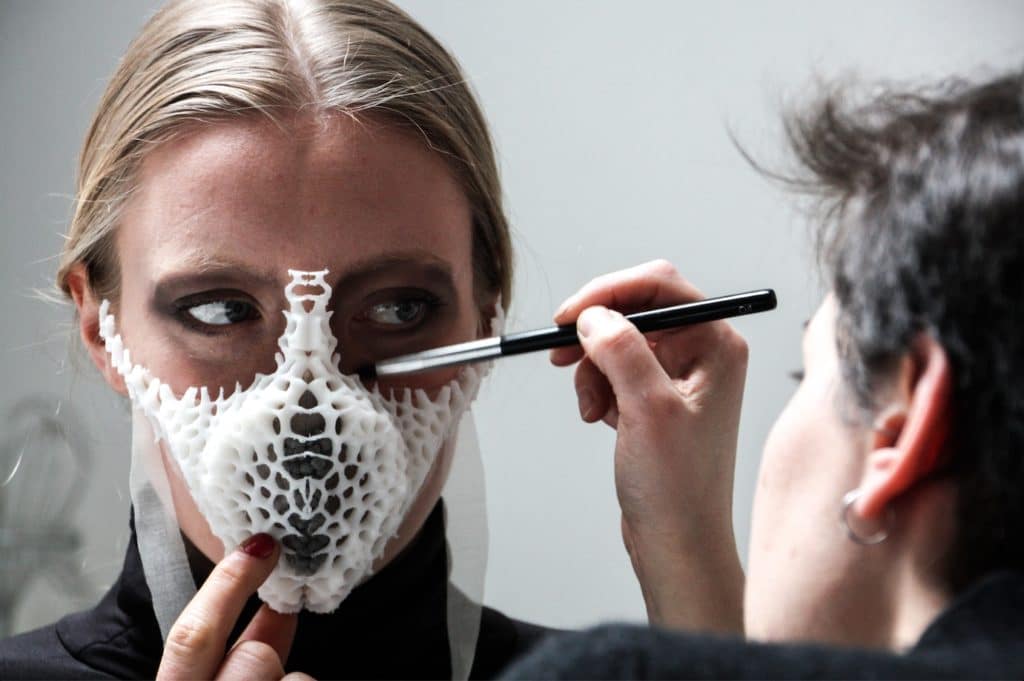
Pollution Mask, Fabricademy Barcelona Final Project, Laura Civetti, 2018
AtlasAction: If you want to take action in changing the fashion industry, take a step to become a revolutionary fashion designer by enrolling into the Fabricademy course. If you are curious about all the possibilities and programs related to the Fab Lab movement, just visit the closest Fab Lab in your town, find your local lab via fablabs.io
Bio
Communication and Design Lead at the Fab Lab Barcelona | IAAC
Project leader
Anastasia Pistofidou
Support the Atlas
We want the Atlas of the Future media platform and our event to be available to everybody, everywhere for free – always. Fancy helping us spread stories of hope and optimism to create a better tomorrow? For those able, we'd be grateful for any donation.
- Please support the Atlas here
- Thank you!
